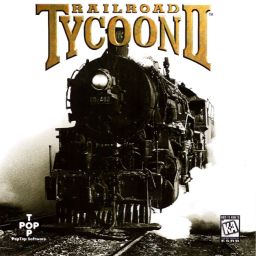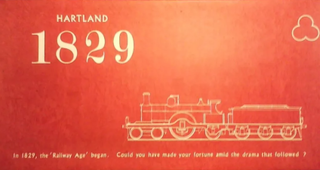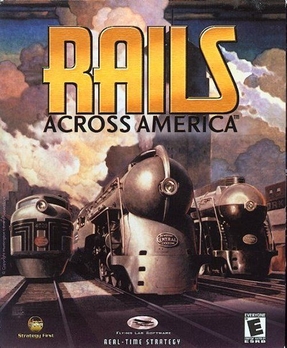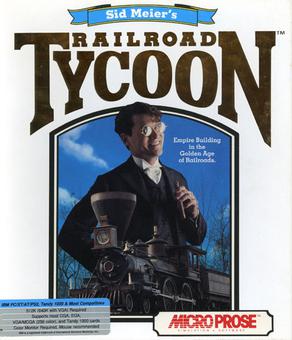
Sid Meier's Civilization is a 1991 turn-based strategy 4X video game developed and published by MicroProse. The game was originally developed for MS-DOS running on a PC, and it has undergone numerous revisions for various platforms. The player is tasked with leading an entire human civilization over the course of several millennia by controlling various areas such as urban development, exploration, government, trade, research, and military. The player can control individual units and advance the exploration, conquest and settlement of the game's world. The player can also make such decisions as setting forms of government, tax rates and research priorities. The player's civilization is in competition with other computer-controlled civilizations, with which the player can enter diplomatic relationships that can either end in alliances or lead to war.

Monopoly is a multiplayer economics-themed board game. In the game, players roll two dice to move around the game board, buying and trading properties and developing them with houses and hotels. Players collect rent from their opponents and aim to drive them into bankruptcy. Money can also be gained or lost through Chance and Community Chest cards and tax squares. Players receive a salary every time they pass "Go" and can end up in jail, from which they cannot move until they have met one of three conditions. House rules, hundreds of different editions, many spin-offs, and related media exist.

Civilization is a board game designed by Francis Tresham, published in the United Kingdom in 1980 by Hartland Trefoil and in the United States in 1981 by Avalon Hill. The Civilization brand is now owned by Hasbro. It was out of print for many years, before it saw republication in 2018, by Gibsons Games. The game typically takes eight or more hours to play and is for two to seven players.

The Penn Central Transportation Company, commonly abbreviated to Penn Central, was an American class I railroad that operated from 1968 to 1976. Penn Central combined three traditional corporate rivals, all united by large-scale service into the New York metropolitan area and New England and Chicago. The new company failed barely two years after formation, the largest bankruptcy in U.S. history at the time. The Penn Central's railroad assets were nationalized into Conrail along with the other bankrupt northeastern roads; its real estate and insurance holdings successfully reorganized into American Premier Underwriters.
Rail Baron is a railroad board game for 3 to 6 players.

18XX is the generic term for a series of board games that, with a few exceptions, recreate the building of railroad corporations during the 19th century; individual games within the series use particular years in the 19th century as their title, or "18" plus a two or more letter geographical designator. The games 2038, set in the future, and Poseidon and Ur, 1830 BC, both set in ancient history, are also regarded as 18XX titles as their game mechanics and titling nomenclature are similar despite variance from the common railroad/stock-market theme.

Bruce Campbell Shelley is an American board and video game designer. He is primarily associated as the co-designer of the video games Railroad Tycoon and Civilization with Sid Meier, and later the Age of Empires series.

Simtex was a video game developer established by Steve Barcia in 1988. It created a number of turn-based strategy games for the PC, most notably the first two Master of Orion games. The company closed in 1997.

Railroad Tycoon II is a business simulation video game in the Railroad Tycoon series developed by PopTop Software and published by Gathering of Developers. It was released for Microsoft Windows, Mac OS, PlayStation and Dreamcast. It was later ported and released for Linux.

Francis Tresham was a British board game designer who produced board games since the early 1970s. Tresham founded and ran games company Hartland Trefoil, a company well-known for its Civilization board game, until its sale to MicroProse in 1997. His 1829 game was the first of the 18xx board game series and some of his board games inspired Sid Meier computer games such as Railroad Tycoon.

1829, later called 1829 (South), is a board game published by Hartland Trefoil in 1974 that simulates railroad operations and trading of company shares. The game was the first in what became known as the 18xx series of railway games that has engendered over 250 licensed titles.

Sid Meier's Railroads! is a business simulation game developed by Firaxis Games on the Gamebryo game engine that was released in October 2006 and is the sequel to Railroad Tycoon 3. Although Sid Meier created the original Railroad Tycoon, subsequent versions were developed by PopTop Software. Railroads! was the first game in the series since the original to have direct input from Sid Meier himself. After a visit to Miniatur Wunderland in Hamburg, Germany, Meier was inspired to reinvent his original creation. A version for the Mac OS X was published by Feral Interactive on November 1, 2012, under the latter's Feral Legends label. A mobile version was released in April 2023.
Civilization is a series of turn-based strategy video games, first released in 1991. Sid Meier developed the first game in the series and has had creative input for most of the rest, and his name is usually included in the formal title of these games, such as Sid Meier's Civilization VI. There are six main games in the series, a number of expansion packs and spin-off games, as well as board games inspired by the video game series. The seventh installment in the series is slated for release on Feb 11, 2025. The series is considered a formative example of the 4X genre, in which players achieve victory through four routes: "eXplore, eXpand, eXploit, and eXterminate".
The concept of video games as a form of art is a commonly debated topic within the entertainment industry. Though video games have been afforded legal protection as creative works by the Supreme Court of the United States, the philosophical proposition that video games are works of art remains in question, even when considering the contribution of expressive elements such as acting, visuals, design, stories, interaction, and music. Even art games, games purposely designed to be a work of creative expression, have been challenged as works of art by some critics.

Rails Across America is a railroad simulation game released in late 2001 by developer Flying Lab Software and publisher Strategy First. It received generally positive reviews. Though no official expansions have been released, a rudimentary map-editing tool was made available to the player community.

Sid Meier's Railroad Tycoon is a business simulation designed by Sid Meier. The game is the first in the Railroad Tycoon series. The original idea came from the boardgame 1830: The Game of Railroads and Robber Barons.
A train game or railway game is a board game that represents the construction and operation of railways. Train games are highly involved, hobby board games that simulate the economic and logistic details of running a railway. Like wargames, train games represent a relatively small niche in the games market.

1830: Railroads & Robber Barons is a video game developed by Simtex and published by Avalon Hill in 1995 for MS-DOS.
Offworld Trading Company is a real-time strategy (RTS) video game developed by Mohawk Games and published by Stardock. The game was released for Microsoft Windows and OS X in April 2016.















